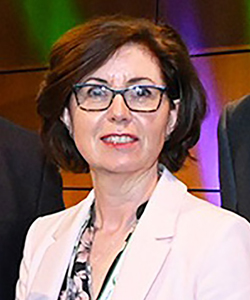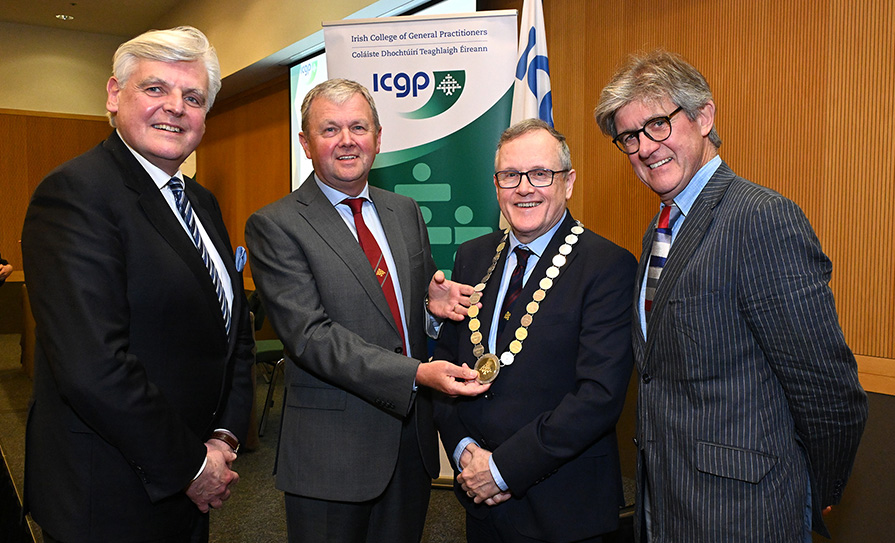The recent ICGP Annual Meeting took place at a critical time for the specialty and the College. Paul Mulholland reports
There is a lot of apprehension within general practice currently. Many GPs are worried the expansion of eligibility announced in Budget 2023 will overwhelm practices, many of which are already struggling with their current workload. The demographics of general practice are another concern, with 25 per cent of GPs over 60 years of age and due to retire in the coming years.
When asked by the Medical Independent (MI) to describe the atmosphere at the recent ICGP Annual Meeting, the College’s outgoing President Dr Paul Armstrong said the mood was “weary, wary, but also quite positive”.
Dr Eamonn Shanahan took over as President at the meeting, which was held in the Convention Centre, Dublin, on Saturday 13 May (Dr Shanahan’s father, Dr Richard Shanahan, was also College President). Following Dr Armstrong’s opening address, Prof Ciaran O’Boyle, Director of the Centre for Positive Psychology and Health, RCSI, delivered the first keynote lecture, which was titled ‘Positive leadership and self-care – what does the science tell us?’.
“I think members are a little bit weary from the difficulties of Covid and the difficulties that brought – the stresses, the changes in working patterns. The structured chronic disease management (CDM) programme is a very significant workload,” Dr Armstrong told MI.
“And they are a little bit wary of the stresses they see and the practical issues they have on the ground.
“There is no doubt that people are concerned about that. And chatting over coffee to people, it is a recurring theme. But there are positives. Covid and the CDM have brought resources into practices. The reversal of FEMPI has corrected a great injustice for a lot of practices and allowed people to plan again. Certainly, some younger GPs see things quite positively and they see there is potential for something long-term here.”
Survey
This is confirmed by the results of a new survey of the career intentions of recent graduates carried out by the College. The survey was conducted in March amongst GPs who had graduated between 2017 and 2022. A total of 269 graduates completed the survey – a response rate of 32 per cent.
At the time of the survey, 96 per cent were working in Ireland. When asked about their future plans, 82 per cent said they definitely planned to stay in Ireland, while only 2.9 per cent said they definitely intended to emigrate.
Dr Armstrong said the results are to be welcomed, but are “not a big surprise”. He said that the majority of recent graduates have returned to Ireland and remain “committed to the system”.
“I think we are only seeing the start of that,” said Dr Armstrong. “But I think the evidence is they will be committing to our health service. The mass GP emigration that we saw in previous decades, particularly when I qualified in the 1980s, and also in the 1970s, we are currently not seeing that.”
He said one of the reasons is that general practice is under great pressure internationally. “It is certainly struggling in the UK,” Dr Armstrong explained. “And in Northern Ireland they are having real, real problems. So it is not as if things are very rosy in other countries. And we have a lot going for us. We have a dynamic young population. It is a very different country to live and work in than in the past. We need to build on that though. We need to put in the resources to do what we want to do with healthcare. And the College sees itself as a very important part of that.”
Shaping the future
The ICGP launched a document titled Shaping the Future of General Practice at its Autumn Conference in October 2022. The discussion paper, which was developed by a group chaired by Dr Armstrong’s direct predecessor as President, Prof Tom O’Dowd, presented 10 potential solutions to the growing shortage of GPs and increasing workload. The proposals included the need to expand GP-led multidisciplinary teams; a doubling of the number of practice nurses; resourcing the career expectations of future GPs; and increasing the exposure time to general practice within the medical curriculum.
The ICGP has already taken the lead on some of the proposals. For example, Shaping the Future recommended a non-EU rural GP programme to fast-track suitably qualified GPs and enable them to qualify to take a GMS list. This initiative, which has been undertaken in collaboration with the HSE, began this year with 25 GPs commencing the programme in February. An additional 25 GPs started this month. The target is to have 100 GPs on the programme by the end of the year and an additional 200 next year.
However, wider input is required to implement other recommendations. At the time of the document’s launch, the ICGP called for the establishment of a high-level working group to address the GP workforce and workload crisis. The College expressed some frustration about the lack of engagement from the Minister of Health and the Department of Health on the issue. However, last month, the terms of reference for the much-anticipated strategic review of general practice were announced by the Minister.
The strategic review, which formed part of the agreement between health management and the IMO in 2019, will identify the challenges facing general practice in delivering a sustainable service into the future. According to the Department, it will draw on the expertise of the HSE and general practice, and include consultation with the ICGP and the IMO.
MI asked Dr Armstrong if the ICGP is satisfied that its concerns are being listened to and that the solutions proposed in Shaping the Future will inform the review.
“I know from speaking to the Minister he was aware of [the recommendations] and was able to quote some of them back,” he replied.
“We are particularly happy now that the Minister is now introducing the review. And our document will feed into that in a very positive and constructive way.”
Dr Armstrong admitted, however, that the strategic review is “overdue”. “We have been waiting some time for it,” he added. “We were a bit frustrated at that. But it has been announced. As a key stakeholder, the ICGP has been asked to become involved and other stakeholders as well – some other individual GPs. So we welcome that. We now want to see it start its work. We want to see it take into account all the evidence that is there and all the stories that are there… and we want to see it move on to the next stage.”
Incoming Chair of the ICGP, Dr Deirdre Collins, also welcomed the review.
“It will be part of discussions at each board meeting,” according to Dr Collins, who is a current board member of the College and will replace the existing Chair Dr John Farrell in June.
“We have tasked people who are going to be part of it, and we are very pleased that they are doing that. It is all about protecting and preserving general practice.”
Change
Dr Collins noted that the landscape of general practice is different than it was before the Covid-19 pandemic.

“The population of GPs is older,” she explained. “People are also tired because of the huge effort in keeping their own businesses afloat and doing what they needed to do during Covid. And there are people examining their work-life balance and saying, ‘how much longer can I do this?’.”
There has also been a change in workload brought about by the structured CDM programme, which was introduced in February 2020.
“It’s fantastic; it’s a great programme. Patients love it; it’s great for patients. Patients are so appreciative that the doctor and nurse are spending time talking to them about health in a planned way, rather than only coming in when there is a problem,” she said. “However, with that, it means we are increasingly managing patients who have lots of things wrong with them. So the multi-morbid, complex, patient has absolutely landed in general practice. And we are going to have to allocate time for them. And we are good at it. The interim reports [on the structured CMD programme] show there is very, very good work being done. But, we are taking on those patients who traditionally or conventionally would have gone into the hospital system, and with that comes a significant change in workload.”
Education
At the ICGP Annual Meeting, an interactive quiz on CDM took place. It was led by Dr Joe Gallagher, ICGP/HSE Clinical Lead, Cardiovascular Disease, and Dr Shane McKeogh, ICGP/HSE Clinical Lead, Adult Respiratory Disease.
Other presentations focused on the management of gout and osteoarthritis in primary care (Dr Paul Ryan, ICGP Clinical Lead, Therapeutics); acne (Dr John Loughnane, GP with a special interest in dermatology); obesity (Dr Michael Crotty, GP with a special interest in obesity); and detecting cancer early (Dr Una Kennedy, GP Advisor to the National Cancer Control Programme). Dr Ciara McCarthy, ICGP/HSE Clinical Lead, Women’s Health, and Dr Nóirín O’Herlihy, Assistant Medical Director, ICGP, also spoke about managing polycystic ovary syndrome and subfertility in general practice.
Like Dr Armstrong, Dr Collins referred to the “positive energy” at the meeting and she praised the quality of the presentations. Asked about the clinical focus of the agenda, Dr Collins replied: “We are tasked with educating, mentoring, and clinical policy. That’s what we are supposed to be doing for our members. It is up to us to give back what our members need.”
Strategy and training
The month after publishing Shaping the Future, the ICGP launched another important document – Navigating the Future for General Practice: Statement of Strategy 2023-2026. The strategy sets out the priorities for the College over the next number of years. Its six main priorities relate to: Education; training; advocacy; supporting GPs; expanding the message of general practice outside of Ireland; and organisational capacity.
The consultancy firm Crowe was engaged to help with the strategy’s development and the process involved engagement with members.
Given the growth of the ICGP in recent years, particularly with its new remit in GP training, there was a need to assure members they were “at the heart of everything we do”, according to ICGP CEO Mr Fintan Foy.
“That was the focus of the strategy,” Mr Foy told MI. “We are a membership organisation. We are 40 years old next year. It is critical always that members are at the heart of the College.”
Training forms a central part of the strategy. The transfer of GP training from the HSE to the ICGP was approved by the ICGP board in October 2021. This was the culmination of many years of engagement and negotiation between College and HSE representatives.
“Getting to the point of taking ownership for GP training was a long time coming…. The fact that we are now over GP training, and can have better control over it, is very significant.”
Mr Foy said the transfer of responsibility has necessitated a large increase in staffing. This year the College will oversee the training of 286 trainees. In contrast, the trainee intake in 2015 was 153.
“There certainly have been some challenges around it, building up the team to support it to ensure we have the right people in the right place. It has also involved building up other infrastructure within the College in IT, finance, and HR [human resources]. We are a little over two years into it. There have been good days and bad days. But overall, we are satisfied with the direction it is heading in now.”
The hope is that the increase in trainees, alongside initiatives such as the non-EU fast-track programme, will help address the major workforce challenge, said Mr Foy.
“We have to get to a point where we have sustainable numbers coming through the system here, so that we can deal with the fact that there are 600-to-700 GPs due to retire over the next five years. And to meet the demand out there, which we all know is at crisis point.”
Making general practice ‘greener’
The ICGP Annual Meeting earlier this month saw the launch of the Glas Toolkit (Glas is the Irish word for green). The toolkit contains evidence-based information on the activities that GPs and the practice team can undertake to improve the sustainability of their activities.
The initiative has been a major objective of the ICGP sustainability working group. The optional practical tools outlined in the new document aim to minimise the environmental impact of clinical interventions and improve efficiencies of the business of running a practice in terms of practice time, economy, patient engagement with local services, supports, and resources.
The toolkit includes guidance on rational prescribing and disposal of inhalers, antibiotics, and medication reviews.
It also includes a section on rational investigation, testing and self-management; topics that are part of a rapidly growing body of medical research and literature internationally.
“All planetary health-related actions have the potential to improve the carbon footprint of clinician-led general practice activities and the carbon footprint of GP patients, through, for example, active transport (self-propelled transport like walking and cycling without using fossil fuels), weight reduction, increasing dietary intake of plant-based foods, grains and legumes, and smoking cessation,” according to the toolkit document.The document also states that the lowering of energy costs, pharmaco-economics, and reduced wasteful practices in healthcare, such as appropriate medication management, de-prescribing or unnecessary use of paper or single-use items, will save money for practices.
Dr Sean Owens, who is a member of Irish Doctors for the Environment and one of the authors of the document, told the Medical Independent (MI) the toolkit is “a starting point for primary care to start to reconsider their practice in terms of resource use and waste with respect to the environment”.
“It is also an opportunity for Irish general practice to show international leadership in the climate crisis,” Dr Owens told MI.
“The majority of actions or opportunities are clinical in nature and in line with evidence-based medicine and best practice. The toolkit recognises GPs and practice nurses are already at capacity; it is therefore designed as an opt-in rather than a mandated action. There are audits and examples to show what can be done and how to do it. Most importantly, the toolkit emphasises preventative medicine, which is the most carbon efficient of all.”













Leave a Reply
You must be logged in to post a comment.